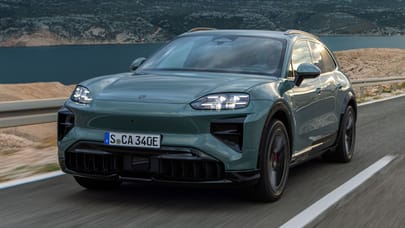
Is Nissan right to make the Qashqai a pure EV?
As new electric crossovers are confirmed for UK production, its president tells us why
Nissan has pledged another £2billion to its British factory with its announcement of fully electric Juke and Qashqai models. While the news doesn’t herald new jobs at the Sunderland plant as yet, it secures those already employed in the years to come.
But is Nissan throwing the dice by evolving its bestsellers into EVs? Not least when the Qashqai topped the UK sales charts overall in 2022, the first home-made car to do so in decades?
“We cannot continue doing what we were doing in the past,” affirms Nissan president Makoto Uchida as he speaks over some strong Sunderland gusts (perfect for its factory wind farm). “Each country has a responsibility to target carbon neutrality. In the next six years we need to closely monitor it.
“We will continue with our mission for 2030. We must be competitive with cost and make the right vehicle to deliver good value to the customer. The world is fragmented now with regulations moving at a different pace. How we transform ourselves to adapt to those circumstances is the key to being sustainable.”
He admits the dawn of more affordable EVs, catalysed by the growth of Chinese brands in Europe, has perhaps arrived ahead of forecasts. “There has been a huge price drop in EVs earlier than expected. Making ourselves competitive in terms of cost is going to be a key success condition for big manufacturers in the coming years.”
Nissan’s senior vice president of R&D, David Moss, echoes his feelings. “The Leaf has a lot more competitors than when we launched the last one. And the one before that. It’s about being confident in your own product, not complacent, and watching the competitors.
“Are we watching the Chinese? Of course we are. They don’t have 90 years of heritage like Nissan does but they’re maybe coming at things with a different viewpoint. We have a very strong brand especially here in the UK.”
Strong enough to support the Qashqai eventually ditching petrol power? “This is a business decision,” Moss adds. “We have a confidence from being in electric vehicles for 12 years and we have three generations of Qashqai that have been successful. We’re marrying two successful sets of technology.”
The platforms underpinning the next generations of Juke and Qashqai, shared with group partner Renault, will be based purely around electric power with no ability to host ICE powertrains. But with Sunderland exporting 80 per cent of its cars, and global markets propelling towards petrol and diesel bans at entirely different rates, insiders suggest the existing generations of crossover could continue production for buyers outside of Europe to “fully utilise the plant”.
Top Gear
Newsletter
Thank you for subscribing to our newsletter. Look out for your regular round-up of news, reviews and offers in your inbox.
Get all the latest news, reviews and exclusives, direct to your inbox.








